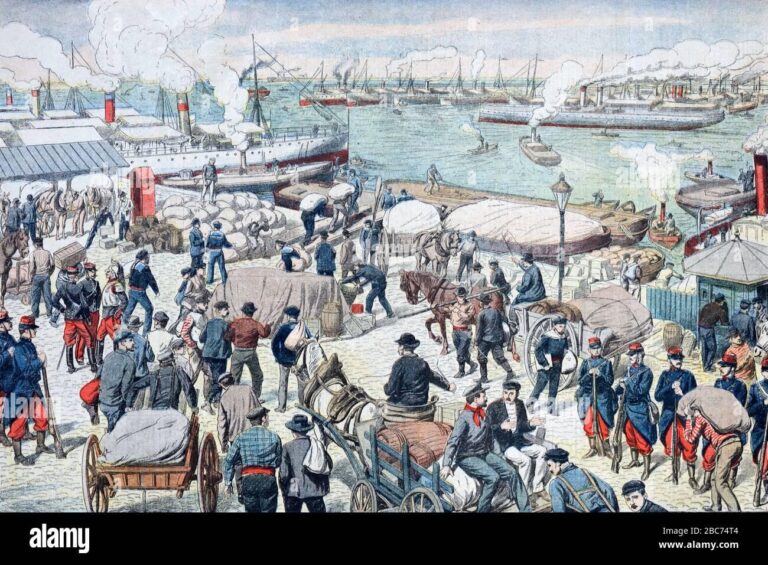In a significant stand against the ongoing conflict in the Middle East, French dockers at the port of Le Havre have taken a bold decision to refuse the loading of cargo containing machine gun parts destined for Israel. This move comes amidst rising tensions and calls for solidarity with Palestinians, reflecting a growing trend among labor unions and workers worldwide to challenge the arms trade. The dockers’ actions have sparked a heated debate over the ethics of supplying military equipment to conflict zones, raising questions about the responsibilities of industrial workers in times of geopolitical strife. As international scrutiny intensifies, this incident highlights the intertwining of labor rights, humanitarian concerns, and global arms trade dynamics.
French Dockers Take a Stand Against Military Cargo Bound for Israel
In a bold move, dockworkers at a French port have taken a stand against the loading of military cargo intended for Israel, specifically parts for machine guns. This action has sparked intense discussions among labor unions, human rights advocates, and government officials, reflecting a growing sentiment regarding arms shipments amidst ongoing conflicts. The dockers, aligning their efforts with broader calls for ethical considerations regarding military exports, have emphasized their commitment to peace and social justice.
Demonstrating solidarity with protests occurring globally, the dockers articulated their concerns over the implications of such military shipments. In statements conveyed during a recent press conference, they highlighted several key reasons for their refusal to load the cargo:
- Human Rights Concerns: The potential use of these arms in conflict zones.
- Global Peace Advocacy: A push towards non-violence and diplomatic solutions.
- Workers’ Rights: The belief that labor should not contribute to actions that undermine peace.
Implications of Labor Actions on International Trade Relations
The recent refusal by French dockers to load a shipment of machine gun parts destined for Israel underscores the complex interplay between labor actions and international trade relations. Labor movements increasingly recognize their power in influencing foreign policy and ethical standards within trade. This incident exemplifies how localized actions can resonate globally, prompting governments and corporations to reevaluate their own stances on contentious geopolitical issues. Not only does this impact the immediate stakeholders, but it also raises questions about the future of trade agreements that cannot afford to disregard ethical considerations.
Furthermore, such labor actions could inspire similar movements across various sectors, amplifying calls for responsible sourcing and accountability in trade practices. Trade negotiations might be affected in response to heightened public awareness and pressure from labor unions, leading to potential shifts in supply chain dynamics. The implications are broad and multifaceted, leading to discussions around sustainable trading practices and labor rights, as illustrated in the table below:
| Impacts of Labor Actions | Potential Results |
|---|---|
| Increased Public Awareness | Greater consumer demand for ethical products |
| Pressure on Corporations | Shifts in business practices toward sustainability |
| Changes in Trade Policies | Revisions of trade agreements to include labor rights |
The Role of Shipping Workers in Global Political Movements
In a powerful display of solidarity and activism, French dockworkers have taken a stand against the transportation of machine gun parts destined for Israel, highlighting the influential role of maritime labor in global political movements. By refusing to load the cargo, they have turned a routine operation into a significant act of protest, underscoring their commitment to ethical labor practices. These dockers are not just workers; they are becoming key players in the discourse surrounding international conflict and human rights, pushing back against the normalization of arms trade with regions experiencing political unrest.
This decision reflects a broader trend where shipping workers, traditionally seen as cogs in the supply chain, are asserting their moral agency. They are tapping into a rich history of labor activism that advocates for social justice and peace. Key elements of this movement include:
- Solidarity with oppressed communities
- Challenge to corporate greed and complicity in conflict
- Promotion of community-based initiatives focused on ethical trade
As governments respond to these actions, the pressure to reconsider arms shipments and trade agreements increases. This scenario serves as a reminder that labor cannot be easily separated from the political landscape and that the decisions made in ports are entwined with questions of morality, ethics, and the quest for a more just world.
Recommendations for Addressing Ethical Concerns in Cargo Handling
The decision by French dockers to refuse the loading of cargo containing machine gun parts bound for Israel highlights the critical intersection of trade ethics and international conflict. To navigate these complex waters, stakeholders in the cargo handling industry should consider implementing a framework that emphasizes transparency and accountability. Establishing clear guidelines regarding the nature of cargo, particularly arms and military equipment, can help companies assess their moral responsibilities. Moreover, involving labor unions in discussions can ensure that workers’ voices are heard in the decision-making process, fostering a collaborative approach to ethical dilemmas.
In this context, it is crucial to develop a Code of Conduct that incorporates the following principles:
- Due Diligence: Conduct thorough assessments of cargo origins and implications.
- Stakeholder Engagement: Facilitate regular dialogues with employees and relevant community groups to gauge positions on contentious shipments.
- Ethical Training: Implement training programs for staff to recognize and navigate ethical concerns surrounding cargo handling.
A proactive stance can significantly mitigate the potential for controversy, allowing the industry not only to uphold ethical standards but also to maintain its reputation in an increasingly scrutinized global landscape.
In Retrospect
In conclusion, the refusal of French dockers to load cargo containing machine gun parts destined for Israel highlights the ongoing complexities surrounding international trade and ethical considerations in conflict zones. This decision not only underscores the growing awareness among labor unions and workers regarding their moral responsibilities but also reflects broader societal debates about arms sales and their implications for global peace. As tensions in the region persist, the actions of these dockers serve as a reminder of the potential impact of grassroots movements in shaping policy and public sentiment. The debate surrounding arms trade is far from settled, and this incident may spark further discussions on how countries, businesses, and individuals can navigate the intricate moral landscape of such decisions.




